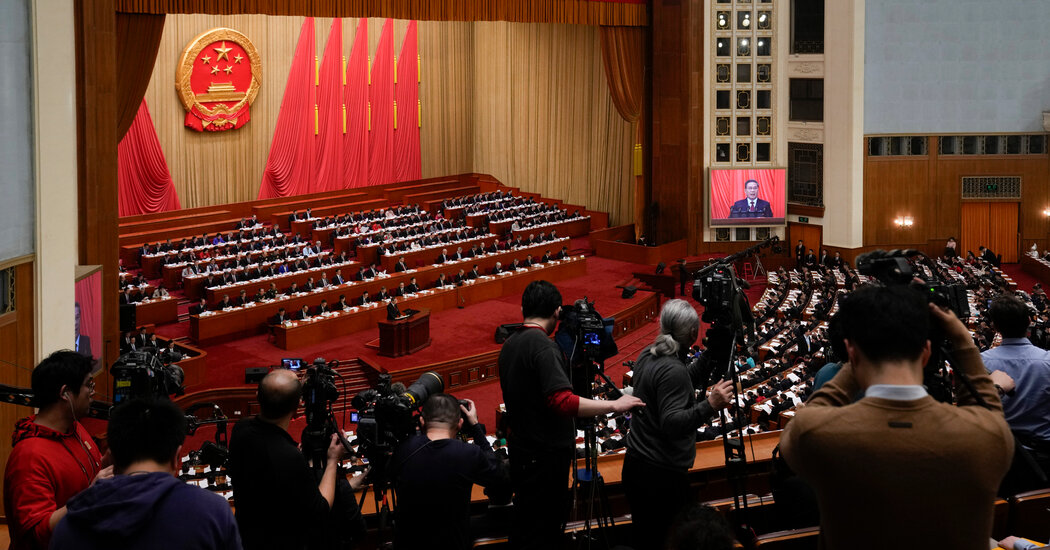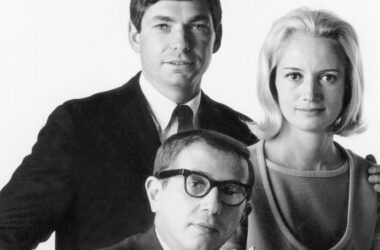For more than 30 years, the Chinese premier’s annual news conference was the only time that a top leader took questions from journalists about the state of the country. It was the only occasion for members of the public to size up for themselves China’s No. 2 official. It was the only moment when some Chinese might feel a faint sense of political participation in a country without elections.
On Monday, China announced that the premier’s news conference, marking the end of the country’s annual rubber-stamp legislature, will no longer be held. With that move, an important institution of China’s reform era was no more.
“Welcome to the Democratic People’s Republic of Korea,” a commenter wrote on the social media platform Weibo, reflecting the sentiment that China increasingly resembles its dictatorial, hermitic neighbor. The search term “news conference” was censored on Weibo, and very few comments remained by Monday evening Beijing time.
Although increasingly scripted, the premier’s news conference at the National People’s Congress was watched by the Chinese public and the world’s political and business elite for signs of economic policy shifts and, occasionally, high-level power plays taking place beneath the surface.
“As stage-managed as it was, it was a window to see how official China works and how official China explains itself to the Chinese people and to the wider world,” said Charles Hutzler, a former colleague of mine who attended 24 premier pressers since 1988 as a journalist for the Voice of America, The Associated Press and The Wall Street Journal.
The decision to do away with the news conference reflects the dire economic conditions China is facing and the leadership’s growing tendency to put the country into a black box. And there is the obvious takeaway: Xi Jinping, China’s top leader, is the only one in charge of a country of 1.4 billion people.
The demise of the news conference also erased the last vestiges of the reform era.
In the 1990s and 2000s, China had two major television events every year: the annual TV gala of the Lunar New Year and the annual news conference with the premier. (Think of the Super Bowl and the Oscars in the United States, and even more so because China had few TV channels and the internet was new.)
The first memorable political TV moment for many Chinese was in November 1987. The departing premier, Zhao Ziyang, mingled with foreign correspondents at a reception at the end of the Communist Party Congress. Chatty and smiling, he answered questions: Was there a power struggle within the party between the reformers and the conservatives? Was there freedom in China? Where was his dapper double-breasted suit made? Mr. Zhao, who was elected the party general secretary at the congress, even let on: “Personally speaking, I believe that I’m more suitable for the position of premier. But they all wanted me to be the general secretary.”
Such a public statement by a Chinese official would be unthinkable today.
Mr. Zhao was later sacked for opposing the bloody crackdown of the Tiananmen Square protesters in 1989. He died while under house arrest. The transcript and the video of the reception show that he dodged the questions, except for the one about his suit. (The suit came from a tailoring house in Beijing called Hongdu, or Red Capital.)
The news conference with the premier was institutionalized in 1993 but didn’t become a must-watch TV event until Zhu Rongji, a sharp-tongued and good-humored premier, took the stage in 1998. Expressing his determination to be a good premier, he declared, “No matter if it’s a minefield or a bottomless abyss ahead, I will forge ahead without hesitation.”
That event was so popular that two people involved in it shot to national fame: a female journalist from a Hong Kong television station who asked a question, and a female staff member from the foreign ministry who interpreted for him in English.
Mr. Zhu’s successor, Wen Jiabao, didn’t make big news at his news conferences until his last one, in 2012. Then, he talked about China’s need for political reform — about the last time a top Chinese leader mentioned it — and foreshadowed the downfall of Bo Xilai, a political rival of Mr. Xi.
Li Keqiang, who served as premier under Mr. Xi for a decade and was sidelined by his domineering boss for much of the time, scored a point for transparency in 2020 when he said some 600 million Chinese, or 43 percent of the population, earned a monthly income of about only $140. His comments poked a hole in Mr. Xi’s claim that China was beating poverty. When Mr. Li died unexpectedly last October, many Chinese went online to thank him for speaking the truth.
For the most part, the premiers used the venue to take questions from the international media and to talk about economic and foreign policies. According to a 2013 article in a state-backed publication, at the first news conferences held by Mr. Zhu, Mr. Wen and Mr. Li each took nearly half the questions from foreign media outlets.
The premier’s news conferences, attended each year by as many as 700 journalists, were originally meant to provide interview opportunities for foreign media, allowing them to better understand China, the article said.
Under Mr. Xi, the Chinese government has expelled and harassed foreign journalists, raided offices of multinational companies and gotten into disputes with big trading partners. Shutting down the news conference will make China more isolated and less transparent to the outside world. That doesn’t bode well for the economy.
A possible reason for the cancellation is that China faces its most serious economic challenges in decades. But the country has gone through tough periods before, including the Asian financial crisis in the late 1990s and the global financial crisis in 2008. Premiers then didn’t have problems communicating the country’s policies with the public and the world.
At issue is how much China, under the leadership of Mr. Xi, values open communication. Media and internet censorship is the heaviest it has been in decades.
Many China watchers speculated that the death of the news conference could be an attempt at self-preservation by the current premier, Li Qiang. Mr. Li was Mr. Xi’s chief of staff in the eastern Zhejiang Province in the 2000s and owes his position to Mr. Xi.
Since taking office last March, Mr. Li has minimized the stature and influence of his role. He flew chartered flights instead of the equivalent of Air Force One, which he is entitled to, making Mr. Xi the only one enjoying the status. He reduced the frequency of the meetings of China’s cabinet, which the premier presides over, from weekly to a couple of times a month. His portraits don’t appear on the website of the cabinet. Nor were they on the major news portals on Tuesday when he delivered the government work report, an annual rite for the premier. As usual, Mr. Xi’s headlines and portraits dominated those sites.
Mr. Li canceled his news conference, a commentator wrote on X, probably not because he lacks eloquence. “It was probably because Li Qiang felt that he would become the focus of the media at the press conference, overshadowing the brilliance of the General Secretary,” the commentator wrote, referring to Mr. Xi. “He hopes to forever remain as the shadow of the General Secretary.”




